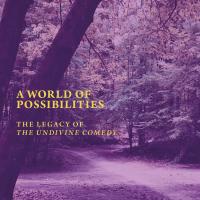Book Section
Laura DiNardo
Reasoning between Possibility, Fictional Reality, and Actuality
A Case Study in Detheologizing the Commedia’s Conditionals
This essay takes its inspiration from the detheologized approach of The Undivine Comedy to consider the role of conditional constructions in the Commedia. Inferno 9 and 27 are offered as case studies to consider how Dante-poet employs the linguistic structure of the conditional as a mechanism to consider possibility and its relation to fictional reality and actuality, thus grounding the truth value of his text in a precise semantic framework.
| Title |
Reasoning between Possibility, Fictional Reality, and Actuality
|
| Subtitle |
A Case Study in Detheologizing the Commedia’s Conditionals
|
| Author(s) |
Laura DiNardo
|
| Identifier | |
| Description |
This essay takes its inspiration from the detheologized approach of The Undivine Comedy to consider the role of conditional constructions in the Commedia. Inferno 9 and 27 are offered as case studies to consider how Dante-poet employs the linguistic structure of the conditional as a mechanism to consider possibility and its relation to fictional reality and actuality, thus grounding the truth value of his text in a precise semantic framework.
|
| Is Part Of | |
| Place |
Berlin
|
| Publisher |
ICI Berlin Press
|
| Date |
December 2025
|
| Subject |
philosophy of language
possibility
possible worlds
conditionals
|
| Rights |
© by the author(s)
Except for images or otherwise noted, this publication is licensed under a Creative Commons Attribution-ShareAlike 4.0 International License.
|
| Language |
en-GB
|
| page start |
99
|
| page end |
122
|
| Source |
A World of Possibilities: The Legacy of The Undivine Comedy, ed. by Kristina M. Olson, Cultural Inquiry, 37 (Berlin: ICI Berlin Press, 2025), pp. 99–122
|
- Abelard, Dialectica, ed. by Lambertus M. De Rijk, rev. 2nd edn (Assen, Netherlands: Van Gorcum & Comp., 1970)
- Alighieri, Dante, The Divine Comedy, trans. by Allen Mandelbaum, 3 vols (Berkeley: University of California Press, 1980–82)
- Alighieri, Dante, Commedia, ed. with commentary by Anna Maria Chiavacci Leonardi, 3 vols (Milan: Mondadori, 1991–97)
- Alighieri, Dante, La Commedia secondo l’antica vulgata, ed. by Giorgio Petrocchi, Società Dantesca Italiana, Edizione Nazionale, 2nd rev. edn, 4 vols (Florence: Le Lettere, 1994)
- Martinich, A. P., and David Sosa, The Philosophy of Language, 6th edn (New York: Oxford University Press, 2013)
- Barolini, Teodolinda, Dante’s Poets: Textuality and Truth in the ‘Comedy’ (Princeton: Princeton University Press, 1984) <https://doi.org/10.1515/9781400853212>
- Barolini, Teodolinda, The Undivine Comedy: Detheologizing Dante (Princeton: Princeton University Press, 1992) <https://doi.org/10.1515/9781400820764>
- Barolini, Teodolinda, ‘Divine Comedy’, in The Palgrave Encyclopedia of the Possible, ed. by Vlad P. Glăveanu (Cham: Palgrave MacMillan, 2022), pp. 437–44 <https://doi.org/10.1007/978-3-030-90913-0_254>
- Barolini, Teodolinda, ‘Possible Worlds and Reading Dante’s Commedia: Suspension of Disbelief (Coleridge, Horace, Tolkien, Cecco d’Ascoli) and the Solvents of Narrative and History’, in A World of Possibilities: The Legacy of The Undivine Comedy, ed. by Kristina M. Olson, Cultural Inquiry, 37 (Berlin: ICI Berlin Press, 2025), pp. ##–## <https://doi.org/10.37050/ci-37_02>
- Boethius, De hypotheticis syllogismis, ed. and trans. into Italian by Luca Obertello (Brescia: Paideia, 1969)
- Brambilla Ageno, Franca, ‘Periodo ipotetico’, Appendix to Biografia, Lingua e stile, Opere, in Enciclopedia Dantesca, ed. by Umberto Bosco, 6 vols (Rome: Istituto dell’Enciclopedia Italiana, 1970–1978), VI (1978), pp. 408–24
- Colella, Gianluca, Costrutti condizionali in italiano antico (Rome: Aracne, 2010)
- Coleridge, Samuel Taylor, Biographia Literaria, in The Collected Works of Samuel Taylor Coleridge, 16 vols (Princeton: Princeton University Press, 1969–2001), VII (1985), pp. 1–856
- Crisafi, Nicolò, Dante’s Masterplot and Alternative Narratives in the ‘Commedia’ (Oxford: Oxford University Press, 2022) <https://doi.org/10.1093/oso/9780192857675.001.0001>
- Fosca, Nicola, Commentary to the Inferno, in The Dartmouth Dante Project, 2025 <https://dante.dartmouth.edu/> [accessed 9 June 2025]
- Glăveanu, Vlad P. , ed., Palgrave Encyclopedia of the Possible (Cham: Palgrave MacMillan, 2022) <https://doi.org/10.1007/978-3-030-90913-0>
- Kripke, Saul, Naming and Necessity (Malden, MA: Blackwell Publishing, 1981)
- Lewis, David, Counterfactuals (Cambridge, MA: Harvard University Press, 1973)
- Lewis, David, ‘Truth in Fiction’, American Philosophical Quarterly, 15.1 (1978), pp. 37–46
- Markulin, Joseph, ‘Dante’s Guido da Montefeltro: A Reconsideration’, Dante Studies, 100 (1982), pp. 25–40
- Mates, Benson, ‘Leibniz on Possible Worlds’, in Leibniz: A Collection of Critical Essays, ed. by Harry G. Frankfurt (Garden City, NY: Anchor Books, 1972), pp. 335–64
- Menzel, Christopher, ‘Possible Worlds’, in The Stanford Encyclopedia of Philosophy, ed. by Edward N. Zalta, Summer 2024 edn <https://plato.stanford.edu/entries/possible-worlds/> [accessed 9 June 2025]
- Riffaterre, Michael, Fictional Truth (Baltimore: Johns Hopkins University Press, 1990) <https://doi.org/10.56021/9780801839337>
- Ryan, Marie-Laure, Possible Worlds, Artificial Intelligence, and Narrative Theory (Bloomington: Indiana University Press, 1991) <https://doi.org/10.2979/2675.0>
- Stalnaker, Robert, ‘A Theory of Conditionals’, in Studies in Logical Theory, ed. by Nicholas Rescher (Oxford: Blackwell Publishing, 1968), pp. 98–112
- Starr, Willow, ‘Counterfactuals’, in The Stanford Encyclopedia of Philosophy, ed. by Edward N. Zalta, Winter 2022 edn <https://plato.stanford.edu/archives/win2022/entries/counterfactuals/> [accessed 9 June 2025]
- Vignuzzi, Ugo, ‘Se (sed)’, in Enciclopedia Dantesca, ed. by Umberto Bosco, 6 vols (Rome: Istituto dell’Enciclopedia Italiana, 1970–1978), V (1976), pp. 112–17
- Wiles, J. C., ‘“Se non…” ( Inf 9.9) and “I vostri mali…” (23.109): Interpretative Issues of Infernal Aposiopesis’, Annali d’italianistica, 39 (2021), pp. 205–27

